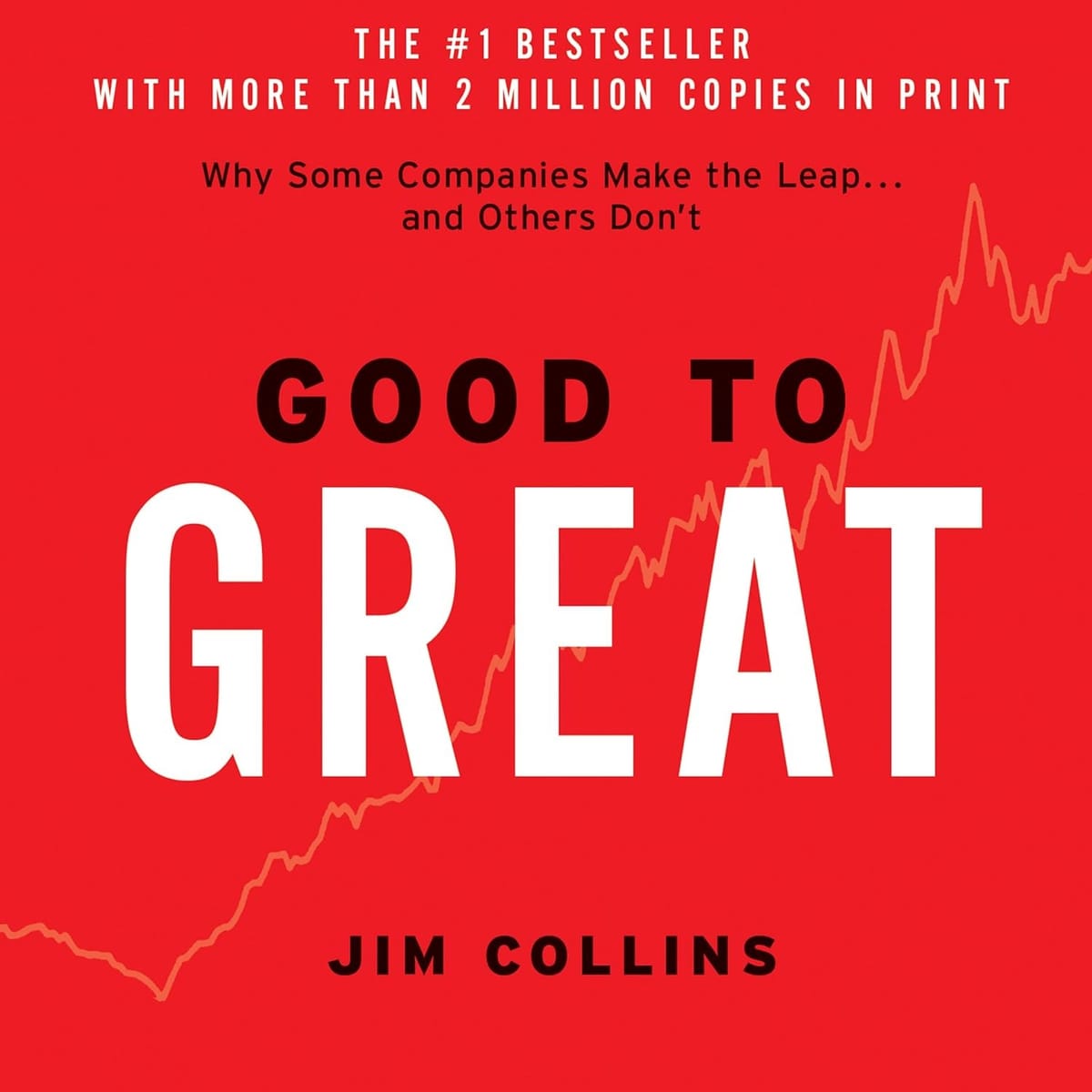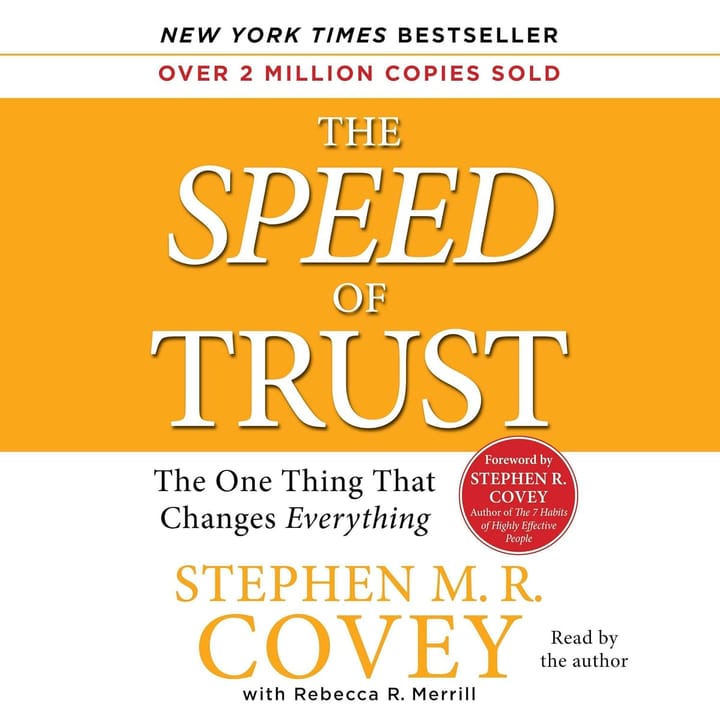Good to Great Book Summary
Discover the key insights and principles from Jim Collins' "Good to Great," and learn how companies achieve enduring success and exceptional performance.

Key Takeaways:
- The Hedgehog Concept: Focus on what you can be the best at, what drives your economic engine, and what you are deeply passionate about.
- Level 5 Leadership: Good to great companies are led by individuals who possess a unique blend of personal humility and professional will.
- Culture of Discipline: Successful companies maintain disciplined people, thought, and action, which allows them to achieve sustained success.
Introduction
"Good to Great" by Jim Collins is a seminal work that explores how good companies can transform into great companies. This book is based on extensive research conducted by Collins and his team, who analyzed the performance of various companies over a period of time. The findings reveal key factors that differentiate great companies from their merely good counterparts. This summary will delve into the core concepts and insights from the book, providing valuable lessons for business leaders and organizations striving for greatness.
The Research Team and Methodology
Jim Collins and his research team embarked on a rigorous study to identify what makes a company great. They examined 1,435 companies, narrowing them down to 11 that made the leap from good to great. These companies outperformed the general stock market by at least three times over a 15-year period. The research was meticulous, involving qualitative and quantitative analysis to uncover the underlying principles of greatness.
The team compared these great companies with a set of comparison companies that failed to make the leap. This comparative analysis helped isolate the factors that contributed to sustained greatness. The research methodology was designed to ensure that the findings were robust and applicable across various industries.
Level 5 Leadership
One of the most striking findings from the research is the concept of Level 5 Leadership, which is exemplified by good to great leaders. Great companies are led by individuals who exhibit a unique blend of personal humility and professional will. These leaders are not driven by ego or personal ambition but are deeply committed to the success of their organizations.
Level 5 leaders possess an unwavering resolve to do whatever it takes to make their companies great. They are modest, often shunning the limelight, and focus all their efforts on building a great company. This leadership style contrasts sharply with the celebrity CEO model, where the leader’s personal brand often overshadows the company’s achievements.
The Hedgehog Concept
The Hedgehog Concept is another cornerstone of the book. It is based on the ancient Greek parable that states, "The fox knows many things, but the hedgehog knows one big thing." Great companies operate like hedgehogs, focusing on a single idea that drives their success. This concept is built around three intersecting circles: what you can be the best at, what drives your economic engine, and what you are deeply passionate about.
Companies that achieve greatness have a deep understanding of their Hedgehog Concept. They align all their efforts around this single idea, which becomes the guiding principle for their strategic decisions. This focus allows them to excel in their chosen area and achieve sustained success.
Confront the Brutal Facts
Great companies do not shy away from confronting the brutal facts of their reality. They maintain a culture where the truth is heard, no matter how harsh it may be. This practice enables them to make informed decisions and adapt to changing circumstances. This practice aligns with the Stockdale Paradox, which emphasizes the importance of confronting brutal facts while never losing faith in the ultimate success.
Collins emphasizes the importance of creating an environment where people feel safe to speak up and share their insights. This openness to confronting the brutal facts helps companies avoid the pitfalls of complacency and denial, which can lead to failure.
The Flywheel and the Doom Loop
The Flywheel concept illustrates how great transformations do not happen in one fell swoop. Instead, they result from a series of small, consistent actions that build momentum over time. This cumulative effort eventually leads to a breakthrough, propelling the company to greatness.
In contrast, the Doom Loop represents companies that lack consistency and direction. These companies often engage in short-term initiatives and quick fixes, which fail to produce lasting results. The Flywheel effect underscores the importance of sustained effort and disciplined action in achieving greatness.
Culture of Discipline
A Culture of Discipline is a hallmark of great companies, encompassing disciplined people, disciplined thought, and disciplined action. These organizations maintain disciplined people, thought, and action, which allows them to execute their strategies effectively. This discipline is not about rigid control but about fostering an environment where self-disciplined people can thrive.
Collins points out that disciplined people do not need to be managed tightly. Instead, they are given the freedom to innovate and take ownership of their work. This culture of discipline enables companies to stay focused on their goals and achieve sustained success.
Technology Accelerators
Great companies use technology as an accelerator, not a driver, of their success. They do not adopt new technology for the sake of it but integrate it in ways that enhance their Hedgehog Concept. This strategic use of technology helps them maintain their competitive edge and achieve their goals more efficiently.
Collins emphasizes that technology alone cannot make a company great. It is the disciplined application of technology, aligned with the company's core values and strategic focus, that makes all the difference. This approach ensures that technology serves as a tool for achieving greatness, rather than a distraction.
The Role of Core Values
Core values play a crucial role in the success of great companies. These values are deeply ingrained in the organization's culture and guide all their actions and decisions. Great companies remain true to their core values, even in the face of challenges and adversity.
Collins highlights that core values are not just slogans or marketing gimmicks. They are the fundamental beliefs that underpin the company's identity and drive its success. By staying true to their core values, great companies build a strong foundation for sustained greatness.
The Importance of the Right People
Having the right people on the team is essential for achieving greatness. Great companies prioritize getting the right people on board and ensuring they are in the right roles. This focus on talent ensures that the organization has the capability to execute its strategies effectively. Equally important is getting the wrong people off the bus to ensure that the team is fully aligned with the company’s vision and values.
Collins emphasizes that it is not just about hiring talented individuals but also about creating an environment where they can thrive. Great companies invest in their people, providing them with the resources and support they need to succeed. This focus on talent management is a key factor in their sustained success.
The Power of a Single Idea
Great companies often revolve around a single, compelling idea that drives their success. This idea becomes the focal point for all their efforts and decisions. By maintaining a clear and focused vision, these companies can achieve remarkable results.
Collins points out that this single idea is not just a strategic goal but a deeply held belief that permeates the entire organization. It provides a sense of purpose and direction, guiding the company's actions and decisions. This clarity of vision is a critical factor in achieving greatness.
The Role of Leadership in Transformation
Leadership plays a pivotal role in the transformation from good to great. Great leaders are not only visionary but also pragmatic. They understand the importance of balancing long-term goals with short-term realities.
Collins emphasizes that great leaders are not afraid to make tough decisions and take bold actions. They possess the courage to confront the brutal facts and the resilience to stay the course, even in the face of adversity. This combination of vision and pragmatism is essential for driving successful transformations.
The Impact of Strategic Difference
Strategic difference is a key factor that sets great companies apart from their competitors. These companies identify and leverage unique strengths that give them a competitive edge. This strategic focus allows them to differentiate themselves in the market and achieve sustained success.
Collins points out that strategic difference is not about being different for the sake of it but about identifying and capitalizing on unique opportunities. Great companies have a deep understanding of their strengths and use them to create value for their customers. This strategic focus is a critical factor in their success.
The Role of Self-Discipline
Self-discipline is a common trait among the leaders and employees of great companies. This discipline is not imposed from the outside but comes from within. It is the driving force that enables individuals to stay focused on their goals and execute their strategies effectively.
Collins emphasizes that self-discipline is not about rigid control but about maintaining a sense of purpose and direction. It is about staying true to the company's core values and making decisions that align with its strategic goals. This self-discipline is a key factor in achieving sustained success.
The Importance of a Deep Understanding
Great companies have a deep understanding of their business and the factors that drive their success. This understanding is not superficial but is based on rigorous research and analysis. It enables them to make informed decisions and adapt to changing circumstances.
Collins points out that this deep understanding is not just about data and metrics but also about insights and intuition. Great companies combine analytical rigor with creative thinking to develop a comprehensive understanding of their business. This deep understanding is a critical factor in their success.
The Role of Professional Will
Professional will is a defining characteristic of the leaders of great companies. These leaders possess an unwavering resolve to do whatever it takes to make their companies great. They are not driven by personal ambition but by a deep commitment to the success of their organizations.
Collins emphasizes that professional will is not about being ruthless or aggressive but about being determined and focused. It is about having the courage to make tough decisions and the resilience to stay the course, even in the face of adversity. This professional will is a key factor in achieving sustained success.
The Impact of Personal Humility
Personal humility is another defining characteristic of the leaders of great companies. These leaders are modest and self-effacing, often shunning the limelight. They are not driven by ego or personal ambition but by a deep commitment to the success of their organizations.
Collins points out that personal humility is not about being weak or passive but about being confident and self-assured. It is about having the strength to put the needs of the organization above personal interests. This personal humility is a key factor in achieving sustained success.
The Role of a Great Vision
A great vision is a critical factor in the success of great companies. This vision provides a sense of purpose and direction, guiding the company's actions and decisions. It is not just a strategic goal but a deeply held belief that permeates the entire organization.
Collins emphasizes that a great vision is not about being grandiose or unrealistic but about being clear and focused. It is about having a compelling idea that drives the company's success. This great vision is a key factor in achieving sustained success.
The Importance of Rigorous Research
Rigorous research is a hallmark of great companies. These organizations invest in understanding their business and the factors that drive their success. This research is not just about data and metrics but also about insights and intuition.
Collins points out that rigorous research is not about being academic or theoretical but about being practical and actionable. It is about using research to inform decisions and drive strategic initiatives. This rigorous research is a key factor in achieving sustained success.
The Role of a Great Journey
The journey from good to great is not a one-time event but a continuous process. Great companies understand that achieving greatness is a long-term commitment that requires sustained effort and discipline.
Collins emphasizes that this journey is not about quick fixes or short-term gains but about building a strong foundation for sustained success. It is about staying true to the company's core values and maintaining a clear focus on its strategic goals. This great journey is a key factor in achieving sustained success.
The Impact of a Single Idea
A single, compelling idea is a driving force behind the success of great companies. This idea becomes the focal point for all their efforts and decisions, providing a sense of purpose and direction.
Collins points out that this single idea is not just a strategic goal but a deeply held belief that permeates the entire organization. It provides a sense of purpose and direction, guiding the company's actions and decisions. This clarity of vision is a critical factor in achieving greatness.
The Role of a Great Company
A great company is not just about financial performance but about creating value for its customers, employees, and stakeholders. Great companies are driven by a sense of purpose and a commitment to excellence.
Collins emphasizes that a great company is not just about being successful but about making a positive impact on the world. It is about creating value and making a difference. This sense of purpose is a key factor in achieving sustained success.
The Importance of a Deeply Passionate Team
A deeply passionate team is a critical factor in the success of great companies. These organizations prioritize getting the right people on board and ensuring they are in the right roles. This focus on talent ensures that the organization has the capability to execute its strategies effectively.
Collins emphasizes that it is not just about hiring talented individuals but also about creating an environment where they can thrive. Great companies invest in their people, providing them with the resources and support they need to succeed. This focus on talent management is a key factor in their sustained success.
The Role of a Great Vision
A great vision is a critical factor in the success of great companies. This vision provides a sense of purpose and direction, guiding the company's actions and decisions. It is not just a strategic goal but a deeply held belief that permeates the entire organization.
Collins emphasizes that a great vision is not about being grandiose or unrealistic but about being clear and focused. It is about having a compelling idea that drives the company's success. This great vision is a key factor in achieving sustained success.
The Importance of Rigorous Research
Rigorous research is a hallmark of great companies. These organizations invest in understanding their business and the factors that drive their success. This research is not just about data and metrics but also about insights and intuition.
Collins points out that rigorous research is not about being academic or theoretical but about being practical and actionable. It is about using research to inform decisions and drive strategic initiatives. This rigorous research is a key factor in achieving sustained success.
The Role of a Great Journey
The journey from good to great is not a one-time event but a continuous process. Great companies understand that achieving greatness is a long-term commitment that requires sustained effort and discipline.
Collins emphasizes that this journey is not about quick fixes or short-term gains but about building a strong foundation for sustained success. It is about staying true to the company's core values and maintaining a clear focus on its strategic goals. This great journey is a key factor in achieving sustained success.
The Impact of a Single Idea
A single, compelling idea is a driving force behind the success of great companies. This idea becomes the focal point for all their efforts and decisions, providing a sense of purpose and direction.
Collins points out that this single idea is not just a strategic goal but a deeply held belief that permeates the entire organization. It provides a sense of purpose and direction, guiding the company's actions and decisions. This clarity of vision is a critical factor in achieving greatness.
The Role of a Great Company
A great company is not just about financial performance but about creating value for its customers, employees, and stakeholders. Great companies are driven by a sense of purpose and a commitment to excellence.
Collins emphasizes that a great company is not just about being successful but about making a positive impact on the world. It is about creating value and making a difference. This sense of purpose is a key factor in achieving sustained success.
Summary
"Good to Great" by Jim Collins provides valuable insights into what makes a company great. The book emphasizes the importance of Level 5 Leadership, the Hedgehog Concept, and a Culture of Discipline. It highlights the role of technology as an accelerator, the power of a single idea, and the importance of having the right people on the team. The journey from good to great is a continuous process that requires sustained effort, discipline, and a deep understanding of the business. By staying true to their core values and maintaining a clear focus on their strategic goals, companies can achieve sustained success and make a positive impact on the world.
FAQ
What is the Hedgehog Concept in "Good to Great"?
The Hedgehog Concept is a framework that helps companies focus on what they can be the best at, what drives their economic engine, and what they are deeply passionate about. It is based on the idea that great companies operate like hedgehogs, focusing on a single idea that drives their success.
What is Level 5 Leadership?
Level 5 Leadership is a concept introduced by Jim Collins in "Good to Great." It refers to leaders who possess a unique blend of personal humility and professional will. These leaders are deeply committed to the success of their organizations and are not driven by ego or personal ambition.
How do great companies use technology?
Great companies use technology as an accelerator, not a driver, of their success. They integrate technology in ways that enhance their Hedgehog Concept and maintain their competitive edge. Technology is used strategically to achieve the company's goals more efficiently, rather than as a distraction.
Other Books by Jim Collins
- Built to Last: Successful Habits of Visionary Companies
- BE 2.0 (Beyond Entrepreneurship 2.0): Turning Your Business into an Enduring Great Company
- Great by Choice
- Turning the Flywheel: A Monograph to Accompany Good to Great
- How the Mighty Fall: And Why Some Companies Never Give In
- Good to Great :: Why Some Companies Make the Leap &_Others Don't
- Good to Great and the Social Sectors: A Monograph to Accompany Good to Great
Affiliate Disclaimer
Some of the links on this website may be affiliate links. This means that, at no additional cost to you, we may earn a commission if you click through and make a purchase. Your support through these affiliate links helps sustain and improve the quality of the content we provide.



